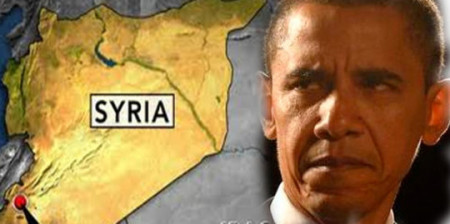The favored spokesman of unnamed American officials, David Ignatius of the Washington Post, announces this morning: “The Obama administration, stung by reversals in Ukraine and Syria, appears to have decided to expand its covert program of training and assistance for the Syrian opposition.”
Ignatius says “knowledgeable officials” have told him that the US will:
1. Double the training of insurgents “in camps in Jordan, northern Saudi Arabia, and Qatar” to 600 per month with the CIA overseeing the program and possibly bringing in US Special Forces;
2. Consider the provision of MANPADS (Man-Portable Air Defense Systems), with strict controls on the anti-aircraft launchers;
3. Vet insurgents to weed out the “jihadists” of Ahrar al-Sham, a key group in the Islamic Front, and the Islamist faction Jabhat al-Nusra.
4. Work with Qatar to fund the program while halting assistance to the “jihadists”.
At the risk of deflating Mr Ignatius’s excitement, let’s be blunt:
There is absolutely nothing new in this claimed shift of US policy and operations.
The CIA has been involved in the training of insurgents since 2012, initially through an operations center in Turkey and later in a base in Jordan. Reporters from The National wrote at length about the Jordanian “secret headquarters” last December.
US officials have put out feelers about the supply of anti-aircraft weapons, with their “tracking devices and remote shutdown mechanisms”, for more than a year. Periodically, there are leaks that Washington is on the verge of stepping up covert supply of weapons — either because one faction within the Obama Administration is trying to get an upper hand over another in the debate over assistance, or because the US wants to appease critics who have wondered Obama never delivered on his promise of June 2013 to provide significant military aid to the insurgency.
The mantra that the US is separating “good moderates” in the insurgency from “bad extremists” is far from new.
In fact, the only significant step in the leak to Ignatius is a negative one, with the US adding Ahrar al-Sham — which has so far not been tarnished like the terrorist-designated Jabhat al-Nusra — to its list of prohibited insurgents.
So what’s the real story here?
It’s woven into Ignatius’s second paragraph: “This stepped-up assistance program is likely to be discussed during talks Friday between President Obama and Saudi King Abdullah.”
In other words, this is an olive branch of All-Will-Be-Well, if not to the Saudis then to a public opinion which might suspect the US has bailed out of any meaningful role in the Syrian conflict.
It’s far from a secret — though apparently Ignatius has not heard the news — that Riyadh has been infuriated with the Obama Administration since Washington pulled away from intervention after the Assad regime’s chemical weapons attacks near Damascus last August.
It is also well-known to those closer to operations in and near Syria that US officials have often blocked or limited supplies and weapons — supplies supported by the Saudis — to the insurgents, particularly in the south.
It may be that some US officials are trying to remove those blocks. It may be that they just want to avoid the label of the bad guys who let the insurgency to its fate against President Assad’s forces.
In either case, as President Obama meets the Saudis in Riyadh, Ignatius eagerly takes on the task of shifting the blame:
The rebels have been pleading for two years for anti-aircraft missiles to stop Assad’s air force, but Saudi Arabia wants U.S. permission before delivering them.
None of this tells us if there will be an actual shift in US policy and operations. Indeed, the significant story this week, coming from the Latakia offensive, is that the insurgents are succeeding despite the lack of assistance from Washington.
But it does tell us that, whatever the reality, Washington will doggedly pursue its propaganda that any “failure” in Syria belongs to others — even if the insurgents and Saudis are unlikely to believe the message.

